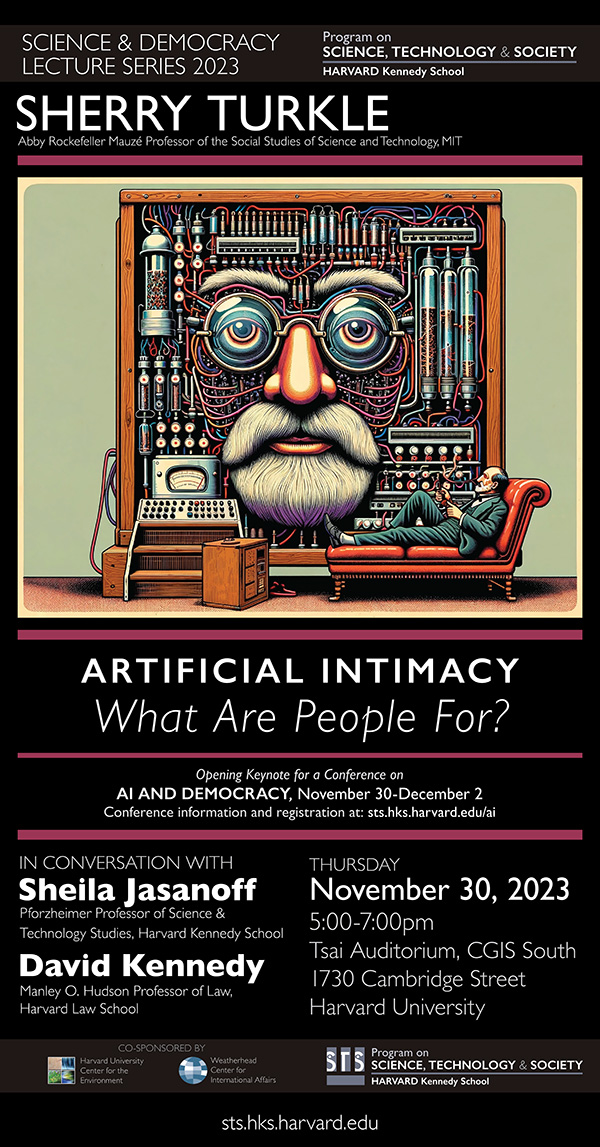Program on Science, Technology and Society at HarvardHarvard Kennedy School of Government | Harvard University |
|||||||
|
|
Artificial Intimacy: What Are People For?Sherry TurkleAbby Rockefeller Mauzé Professor of the Social Studies of Science and Technology, MIT November 30, 2023, 5:00pm-7:00pm AbstractThese days, supported by large language learning programs, people are offered pretend empathy in chatbots that take the role of therapists, companions, and even lovers. But no matter how convincing, these programs can only provide simulations because they have not known the arc of human life. They cannot put themselves in our place. They feel nothing of the human loss, love, or trouble we describe to them. Or that they represent to us. Yet we are comforted by the simpler vision of the world that they provide. Human relations are rich, messy, and demanding. We clean them up with technology. We feel less vulnerable talking to programs than to people. Here, my focus is not on what generative AI can do, but on what this new category of intimate machine is doing to people and our social worlds. PanelSheila JasanoffPforzheimer Professor of Science & Technology Studies, Harvard Kennedy School David KennedyManley O. Hudson Professor of Law, Harvard Law School About the speakerSherry Turkle is the Abby Rockefeller Mauzé Professor of the Social Studies of Science and Technology in the Program in Science, Technology, and Society at MIT. Professor Turkle received a joint doctorate in sociology and personality psychology from Harvard University and is a licensed clinical psychologist. Professor Turkle writes on the "subjective side" of people's relationships with technology, especially computers. She is an expert on culture and therapy, mobile technology, social networking, sociable robotics, and generative AI. Her newest book, The Empathy Diaries: A Memoir (Penguin Press, March 2021), ties together her personal story with her groundbreaking research on technology, empathy, and ethics. Her previous book, the New York Times bestseller, Reclaiming Conversation: The Power of Talk in a Digital Age, investigates how a flight from conversation undermines our relationships, creativity, and productivity. Previous works include four other books about evolving relationships in digital culture (Alone Together: Why We Expect More from Technology and Less from Each Other; The Second Self: Computers and the Human Spirit; Life on the Screen: Identity in the Age of the Internet; and Simulation and Its Discontents), and one book about the history of psychoanalysis, Psychoanalytic Politics: Jacques Lacan and Freud's French Revolution. Turkle has also edited several collections on how we use objects to think with, particularly in the development of ideas about science. These include Evocative Objects: Things We Think With; Falling for Science: Objects in Mind; and The Inner History of Devices. Among other recognition, Professor Turkle has won Guggenheim and Rockefeller Humanities Fellowships, received a Harvard Centennial Medal, and is a fellow of the American Academy of Arts and Sciences. Co-sponsored by Harvard University Weatherhead Center for International Affairs, Harvard University Center for the Environment (A Center of the Salata Institute), and John and Elizabeth McQuillan. |
||||||
